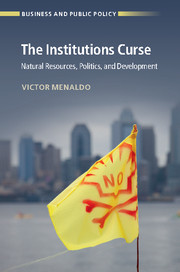Book contents
- Frontmatter
- Dedication
- Contents
- List of figures
- List of maps
- List of tables
- Acknowledgments
- 1 Introduction
- 2 Three puzzles and some building blocks
- 3 Intellectual heritage of the institutions curse view
- 4 The institutions curse theory
- 5 Not manna from heaven after all: the endogeneity of oil
- 6 The resource blessing
- 7 Oil curse or monarchical exceptionalism?
- 8 Conclusions
- References
- Author index
- Subject index
1 - Introduction
Published online by Cambridge University Press: 05 August 2016
- Frontmatter
- Dedication
- Contents
- List of figures
- List of maps
- List of tables
- Acknowledgments
- 1 Introduction
- 2 Three puzzles and some building blocks
- 3 Intellectual heritage of the institutions curse view
- 4 The institutions curse theory
- 5 Not manna from heaven after all: the endogeneity of oil
- 6 The resource blessing
- 7 Oil curse or monarchical exceptionalism?
- 8 Conclusions
- References
- Author index
- Subject index
Summary
The world is richer, more democratic, and healthier than ever before. The trajectory traced by the world's Gross Domestic Product (GDP) is an upward sloping line. The frequency of free and fair elections obeys this pattern too, as do measures of human well-being, such as average lifespans. Despite the unprecedented progress that our species has achieved over the last two centuries, however, development still varies widely across space. It has skipped over some places entirely.
What explains why some countries are more developed than others? Why do Denmark, South Korea, and New Zealand have a thriving economy, a stable and democratic political system, and public policies that benefit the majority of citizens? Why are Congo, Myanmar, and Ecuador poor, unstable, authoritarian, and a hotbed of patronage politics, rent-seeking, and virulent civil strife?
These questions matter greatly. Liberal democracies that are governed by the rule of law, and that generate consistent economic growth, are blessed with smarter, healthier, and happier citizens. They tend to live beyond hardscrabble subsistence, and their children grow up to be statesmen, scientists, and respected businesswomen. They also enjoy the personal security and leisure time required to indulge in artistic expression and engage in philanthropy. Of course, they might live perfectly ordinary lives, with weekend barbeques as the pinnacle of middle-class life. Whatever the case, they probably do not live in constant fear of starvation, violence, or persecution. Their children will probably not become warlords.
While “what determines development?” is among the most important question in social science, many hypotheses that have been put forth to answer it are quite bizarre. For example, some researchers argue that the key to development is warfare and the constant preparation for war (Morris 2014). Others maintain that it is the quality of a nation's genetic stock (Wade 2014) – despite the fact that places such as China and India have experienced big reversals of fortune that were not preceded by any obvious changes in their gene pools (see, e.g., Chanda and Putterman 2007). Perhaps the most perplexing answer that has been put forth so far to explain political and economic underdevelopment, however, is that a country's oil, coal, natural gas, and minerals are a curse.
- Type
- Chapter
- Information
- The Institutions CurseNatural Resources, Politics, and Development, pp. 1 - 24Publisher: Cambridge University PressPrint publication year: 2016

